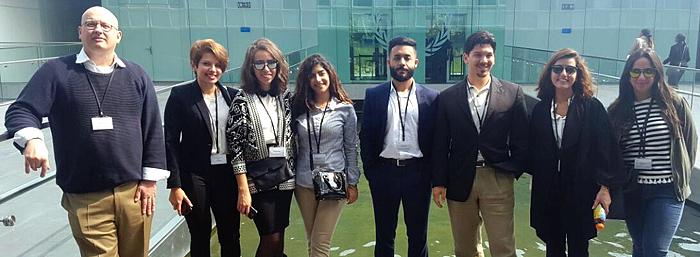- About
- Admissions
- Study at AUS
- Prospective Students
- Bachelor's Degrees
- Master's Degrees
- Doctoral Degrees
- Admission Publications
- International Students
- Contact Admissions
- Grants and Scholarships
- Sponsorship Liaison Services
- Testing Center
- New Student Guide
- File Completion
- New Student Orientation
- Payment Guide
- Executive Education
- Students with Disabilities
- Academics
- Life at AUS
- Research
- Contact Us
- Apply Now
- .

AUS highest ranked team from the Middle East at the ICC Moot Court Competition in The Hague
American University of Sharjah (AUS) students represented the UAE at the International Criminal Court (ICC) Moot Court Competition in The Hague, The Netherlands, during the last week of May 2016. The AUS team was the highest ranked team from the Middle East in the competition.
The AUS team was represented by students Nawaf Zedan, Jumanah Mansour, Farah Hamdy, Farah Mouallem, Hanan Arab and Nourhan Maher. AUS was the only school in the competition which was not represented by law students, but instead drew its team members from students of international politics.
"The Moot Court Program at AUS allows students to apply the skills they have learned in their international studies courses," said team coach Kevin Gray, Assistant Professor in International Studies. "Thanks to the support of the Office of the Dean at the College of Arts and Science, we have been able to fund AUS' participation in these prestigious competitions."
"This was an immensely challenging, yet rewarding program," said Mansour. "Writing legal memorials, conducting legal research and shaping legal oral arguments helped us develop the essential legal skills and knowledge of international criminal judicial systems. This program provided a great basis for all of us on the team to look at pursuing a law degree in the near future, especially with the experience of travelling to The Hague, home to the International Criminal Court and the International Court of Justice."
The students had submitted written memorials as part of a problem focusing on the role of the ICC in investigating environmental war crimes, the forcible recruitment of children as soldiers during armed conflicts, and the requisite standards of impartiality for judges at international courts.

